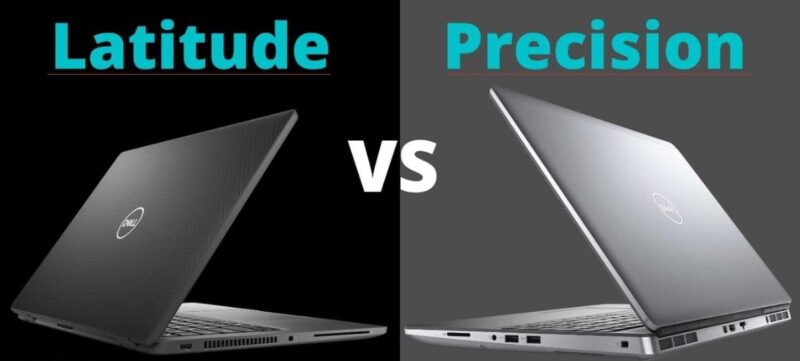Dell offers an extensive range of laptops designed to cater to diverse needs. Two prominent series in their lineup are the Dell Precision and Dell Latitude. While both are high-quality choices, they serve different audiences and purposes. This guide will help you decide which series suits you best by comparing key features and specifications.

Overview of Dell Precision Laptops
The Dell Precision series is tailored for professionals who need high-performance machines for demanding tasks. This series is particularly popular among engineers, architects, and designers.
- Target Audience: Creative professionals and engineers.
- Performance: Equipped with powerful CPUs and GPUs for tasks like 3D modeling, video editing, and simulations.
- Build Quality: Durable and robust, designed for heavy use.
- Display Options: High-resolution displays with excellent color accuracy.
- Expandability: Supports extensive RAM and storage upgrades.
- Operating System: Often pre-installed with Windows 11 Pro.
- Certifications: ISV certifications for compatibility with professional software like AutoCAD and Adobe Suite.
Overview of Dell Latitude Laptops
The Dell Latitude series is aimed at business professionals who prioritize portability, security, and reliability. It’s an ideal choice for office work and on-the-go productivity.
- Target Audience: Business professionals and frequent travelers.
- Performance: Optimized for multitasking and standard business applications.
- Build Quality: Lightweight and portable, designed for mobility.
- Battery Life: Long-lasting battery for extended use.
- Security Features: Includes TPM, fingerprint readers, and smart card support.
- Connectivity: Offers a variety of ports, including USB-C and HDMI.
- Durability: Built to endure travel and frequent handling.
Comparing Dell Precision and Latitude: Key Differences
- Performance Needs:
- Precision: Designed for high-performance tasks like rendering and simulations.
- Latitude: Ideal for everyday business tasks and multitasking.
- Portability:
- Precision: Heavier due to powerful hardware.
- Latitude: Lightweight and travel-friendly.
- Battery Life:
- Precision: Shorter battery life due to high-performance hardware.
- Latitude: Longer battery life, suitable for travel and remote work.
- Display Quality:
- Precision: Superior displays with high resolution and color accuracy.
- Latitude: Focuses on functionality and energy efficiency.
- Price Range:
- Precision: Higher price due to advanced features.
- Latitude: More budget-friendly for businesses.
Which One Should You Choose?
- Choose Dell Precision if:
- You’re a professional needing top-tier performance.
- You work with demanding software and require ISV certifications.
- Display quality and expandability are priorities.
- Choose Dell Latitude if:
- You need a reliable laptop for business tasks.
- Portability and long battery life are essential.
- Security features are a must-have.
Top 5 FAQs on Precision vs Latitude ?
Q. What is the primary difference between precision and latitude?
A. Precision refers to the degree of accuracy or exactness in measurements or performance, often associated with repeatability. Latitude, on the other hand, is the extent of permissible variation within a system or process without compromising functionality. Essentially, precision narrows focus on achieving exact results, while latitude embraces flexibility within acceptable boundaries.
Q. How do precision and latitude impact decision-making?
A. Precision aids in making highly accurate decisions by providing exact data, which is crucial in fields like engineering or scientific research. Latitude, however, supports broader decision-making by allowing for adaptability and tolerance for variation, which is beneficial in dynamic or unpredictable environments like business operations or creative projects.
Q. Can a system have high precision and high latitude simultaneously?
A. Not typically. High precision often requires stringent controls and minimal tolerance for variation, which conflicts with the flexibility that defines high latitude. However, in certain advanced systems, balance can be achieved by incorporating adaptive mechanisms, though this usually comes at a higher cost or complexity.
Q. Why is precision important in manufacturing, and how does latitude play a role?
A. In manufacturing, precision ensures that products meet exact specifications, enhancing quality and reliability. Latitude is also vital as it provides tolerance levels, allowing for minor variations in materials or processes without affecting the final product’s performance. This combination helps optimize production efficiency and reduce waste.
Q. How does the choice between precision and latitude vary across industries?
A. Industries like aerospace or pharmaceuticals prioritize precision due to safety and regulatory requirements. In contrast, fields such as software development or marketing often value latitude to adapt to evolving trends or user needs. The choice depends on the balance between accuracy and flexibility required in a specific context.
Conclusion
Deciding between the Dell Precision and Latitude series depends on your specific needs. If you’re a professional seeking raw power and superior display quality, the Precision series is the better choice. However, if you’re a business user prioritizing mobility, security, and battery life, the Latitude series is ideal. Evaluate your requirements and choose the laptop that aligns with your goals.

Pingback: Precision vs Latitude review by experts| Dell Comparison| Buy now